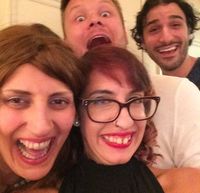Love Letter to the Fearless Dr. Up
Well, it’s somehow the end of April and that brings me to just about the end of my time here as Writer in Residence for Open Book. At the end of the month I’m going to post a quick wrap up of everything that I’ve learned working through these love letters. But, I have to write my last love letter before I can do that, and while I’ve known that this would be my last letter since I decided to structure my residency here in this way, I’ve been dreading writing this one out. How do you write a love letter to a person who won’t ever be able to read it? How do you dredge up the mourning and the grief of a friend you’ve lost when you spent the last nearly two years (TWO YEARS? how did that even happen?!) trying to get on the other side of that grief? So, this is a love letter to Priscila Uppal, wherever she is. The poet, the woman, the professor, and the friend who probably influenced my work more than anyone else I’ve written to during this residency, even though our work is radically different.
I’m struggling to understand the point of this letter. All of these virtual reachings-out, these letters to others to share how and why they’ve changed my poetics, my politics, and my pedagogy have served, in some way, to let these people know this stuff because I don’t—probably can’t—tell them honestly, in person, while we hang. I’m not emotionally closed-off, I don’t think. I tell them I love them and I tell them that they’re the best and I compliment their work (and food and outfits and homes) when I like. But, something about the honesty and the intimacy of sharing how someone else has changed me and my writing is tough to get out. The vulnerability? The potential to be rejected? I don’t know. Something. And this post is more about poetics than it is about me interrogating my emotional walls. The point is that these letters have served as a way for me to say the things I need to say at a safe distance. They’ve let me examine the ways that these poets and friends have enhanced and altered my work in the hopes that a reader might also start to think about these elements of their work. And, I hope these posts make these people feel good.
But, to write to Priscila now when she can’t read it, can’t feel good about it, can’t think about it, all seems so self-serving, and it makes me feel a bit like this has all been self-serving. I feel overexposed and judged. I feel like I’ll post this and someone, somewhere will groan. And that’s funny, I think, because the biggest thing that Priscila did for me (and I know I’m not the only one who got this from her) was to work out that emotional muscle that doesn’t give a feathered fuck about what other people think about you.
One of the biggest questions I get from students or friends who don’t publish their poetry but would like to is: how do you get the guts to just send your work out? And the truth is, that is a muscle, just like any other, and you have to work it out. You have to strengthen that part of you until you’re okay with someone else’s judgement or dislike or disinterest. Priscila did that in a way that no other person I know has been able to. You didn’t have to know her to know that; you could just see her in some beautiful, ridiculous hat (or coat, or dress, or tights … I could go on forever) and know that she owns herself, and no one can tell her anything. And while she did give me a lot of advice (some sought, some not) on other elements of writing or working or life in general, she never really articulated this need to be honest and true to your own desires without worrying about what other people would think of you. That just kind of absorbed into me the more we were together, a kind of confidence osmosis.
Priscila published work that a lot of people didn’t get or didn’t like or didn’t want, but she was so good and so funny and so brutally honest that even if her brand of dark lyrical work was not your thing, you had to respect her game. She sent out early drafts but never really stopped revising. More importantly, she never really stopped writing. Legitimately, we were bringing her pens and paper to write in the hospital when she could barely open her eyes. She never really stopped. She just always understood that the writing was worthwhile, no matter where or how or if it got published. She wanted to write, felt compelled to write, so she did until she physically couldn’t anymore. And she sent it out anywhere, to anyone. She gave poems away at parties and for birthdays and when you came in to help her with housework. She wrote poems instead of doing housework, always. She wrote for herself, but she loved to share it just for the love of sharing it, to have her poems everywhere like wildflowers. And what you thought about her poems? That’s a nice conversation to have over tea or on a walk or with a glass or eight of wine, but it wasn’t the point of the writing or the sharing.
Your CanLit News
Subscribe to Open Book’s newsletter to get local book events, literary content, writing tips, and more in your inbox
So, if there’s anyone reading this who wants to write, wants to share their work because it’s theirs and they love it and they want it shared: do it. Send it out. And if and when you get rejections, you just put that email in a mean old folder and you write a new one, send out a new one, because that’s what you want to be doing. Because you think it’s beautiful. Because it brings you joy. I cannot stress this enough: share your work. At the end of the day, a poem out in the world is another chance at connection. And one day you’re not going to get that chance anymore.
Send out your mediumist work. Be okay with the mediumness of it all. Wear the things you think are fabulous no matter the occasion. Eat the food you love and listen to the music you love and watch the films you love even if they are the worst foods and songs and films and even if everyone else is going to make fun of you. Because this life is so short and it can get shorter before you know it. And if you’re really, really lucky, people will remember you as fearless and filled with love and sharing and connection.
The views expressed in the Writer-in-Residence blogs are those held by the authors and do not necessarily reflect the views of Open Book.







